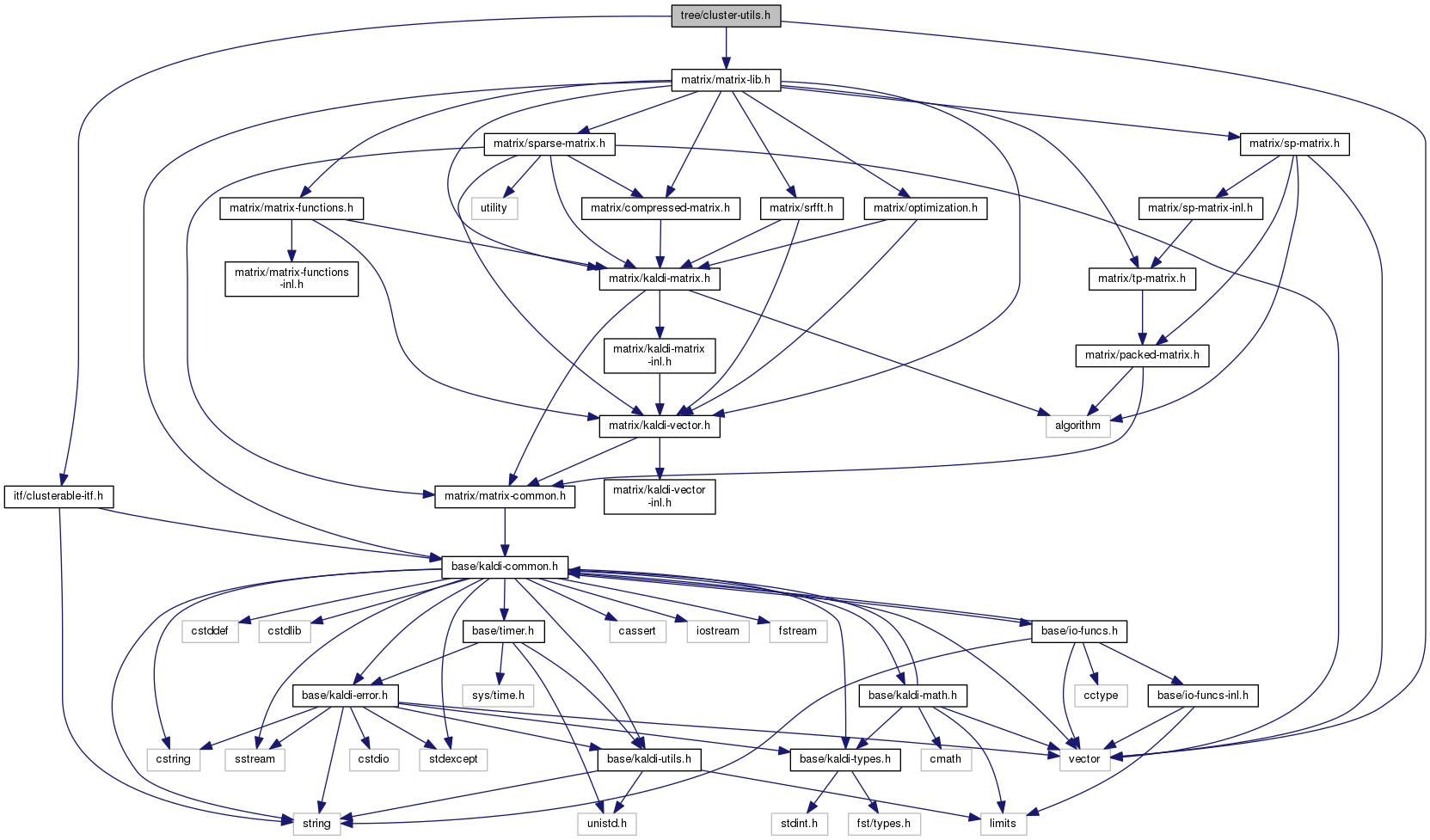|
| BaseFloat | SumClusterableObjf (const std::vector< Clusterable * > &vec) |
| | Returns the total objective function after adding up all the statistics in the vector (pointers may be NULL). More...
|
| |
| BaseFloat | SumClusterableNormalizer (const std::vector< Clusterable * > &vec) |
| | Returns the total normalizer (usually count) of the cluster (pointers may be NULL). More...
|
| |
| Clusterable * | SumClusterable (const std::vector< Clusterable * > &vec) |
| | Sums stats (ptrs may be NULL). Returns NULL if no non-NULL stats present. More...
|
| |
| void | EnsureClusterableVectorNotNull (std::vector< Clusterable * > *stats) |
| | Fills in any (NULL) holes in "stats" vector, with empty stats, because certain algorithms require non-NULL stats. More...
|
| |
| void | AddToClusters (const std::vector< Clusterable * > &stats, const std::vector< int32 > &assignments, std::vector< Clusterable * > *clusters) |
| | Given stats and a vector "assignments" of the same size (that maps to cluster indices), sums the stats up into "clusters." It will add to any stats already present in "clusters" (although typically "clusters" will be empty when called), and it will extend with NULL pointers for any unseen indices. More...
|
| |
| void | AddToClustersOptimized (const std::vector< Clusterable * > &stats, const std::vector< int32 > &assignments, const Clusterable &total, std::vector< Clusterable * > *clusters) |
| | AddToClustersOptimized does the same as AddToClusters (it sums up the stats within each cluster, except it uses the sum of all the stats ("total") to optimize the computation for speed, if possible. More...
|
| |
| BaseFloat | ClusterBottomUp (const std::vector< Clusterable * > &points, BaseFloat thresh, int32 min_clust, std::vector< Clusterable * > *clusters_out, std::vector< int32 > *assignments_out) |
| | A bottom-up clustering algorithm. More...
|
| |
| BaseFloat | ClusterBottomUpCompartmentalized (const std::vector< std::vector< Clusterable * > > &points, BaseFloat thresh, int32 min_clust, std::vector< std::vector< Clusterable * > > *clusters_out, std::vector< std::vector< int32 > > *assignments_out) |
| | This is a bottom-up clustering where the points are pre-clustered in a set of compartments, such that only points in the same compartment are clustered together. More...
|
| |
| BaseFloat | RefineClusters (const std::vector< Clusterable * > &points, std::vector< Clusterable * > *clusters, std::vector< int32 > *assignments, RefineClustersOptions cfg=RefineClustersOptions()) |
| | RefineClusters is mainly used internally by other clustering algorithms. More...
|
| |
| BaseFloat | ClusterKMeans (const std::vector< Clusterable * > &points, int32 num_clust, std::vector< Clusterable * > *clusters_out, std::vector< int32 > *assignments_out, ClusterKMeansOptions cfg=ClusterKMeansOptions()) |
| | ClusterKMeans is a K-means-like clustering algorithm. More...
|
| |
| BaseFloat | TreeCluster (const std::vector< Clusterable * > &points, int32 max_clust, std::vector< Clusterable * > *clusters_out, std::vector< int32 > *assignments_out, std::vector< int32 > *clust_assignments_out, int32 *num_leaves_out, TreeClusterOptions cfg=TreeClusterOptions()) |
| | TreeCluster is a top-down clustering algorithm, using a binary tree (not necessarily balanced). More...
|
| |
| BaseFloat | ClusterTopDown (const std::vector< Clusterable * > &points, int32 max_clust, std::vector< Clusterable * > *clusters_out, std::vector< int32 > *assignments_out, TreeClusterOptions cfg=TreeClusterOptions()) |
| | A clustering algorithm that internally uses TreeCluster, but does not give you the information about the structure of the tree. More...
|
| |

